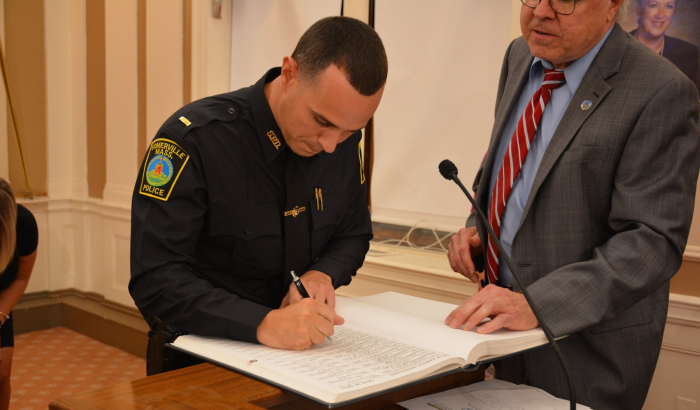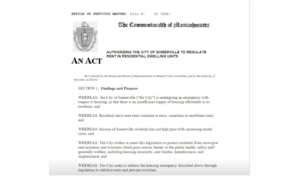The agency’s structure will be developed through a community process.
(Somerville Wire) – Somerville held its first public information session discussing Civilian Oversight of Police on March 24. While the idea of reimagining the police is not a new one, over 150 cities across the country have created oversight agencies as a response to instances of police brutality that garnered widespread attention last year. The killings of George Floyd and Breonna Taylor, among others, have moved many cities like Somerville to rethink the way they approach public safety.
“Generally speaking about distrust of police, this is not a new topic or conversation,” said the City’s Legislative and Policy Analyst Ayerim Decena. “The idea of making sure that an entity that has a lot of power is checked and investigated, should misconduct occur, I think that people generally want that. …When you have people who are armed, who do patrol the streets, who have the responsibility and authority to keep the peace, the community wants to be able to have a say in their policies, the way they behave, or the way they’re trained in the community they serve. As far as the distrust of Somerville residents against Somerville Police Department officers, it seems to just stem from that idea. It’s just keeping an eye on power.”
According to Decena, Somerville residents largely do want a functioning police department, but they also want a collaborative relationship that demands that police be checked and investigated whenever they do behave inappropriately. The City had approximately 300 people complete a survey about the state of the Somerville Police Department, and several key concerns arose. Many think that there are situations where having a police presence is not the best response and feel that having a lot of police around can be intimidating. Others have said that racial profiling and use of force are problems that stand out.
Distrust of the police is also something that is strongly felt by undocumented members of the community, said the City’s Public Outreach Coordinator R. Mason. He explained that addressing the anxiety around policing is interconnected with other problems, as the City has been questioning how funds can be reallocated to other social support systems. There are many conditions in society that can lead to a sense of mistrust of an entity like the police.
“When we think specifically of our undocumented community, as unsafe as they are to call 911… there’s just a general feeling of being unsafe in Somerville when it comes to accessing the food banks or COVID vaccine information. Any type of access that could have a police presence, anywhere, is already working against the process of civilian oversight or the engagement of residents,” said Mason. He added, “How do we define equity and racial justice? …Trying to get to this legislation means that we have to have a conversation on other factors that relate to where we are today.”
The City is still in the process of determining what kind of model the oversight agency will follow, and community input will play a decisive role in this decision. They have considered four different types of models: review-focused, investigative, auditor/monitor, and hybrids. Review-focused ones rely on completed Police Department investigations of misconduct, which are then reviewed. Investigative models can conduct their own, independent investigations of police misconduct. An auditor/monitor system focus on overall, systemic reform and investigate police activity and procedures. Hybrids combine aspects of the others, to fulfill individual community needs.
“I assume that it will eventually be some sort of hybrid model, a two pronged approach where we have a review board and investigative board. That’s how I’m seeing it, based on responses I’ve been getting from the surveys,” said Decena. “There is a lot of interest in an independent, investigative agency. It could be that Somerville residents really just want an investigative model. …But because civilian participation is necessary, I do see a review coming in as well, which would make it a hybrid.”
Representatives from organizations like Defund SPD have expressed reservations about civilian oversight in Somerville. Matthew Kennedy, one of Defund SPD’s founding members, said that he has seen similar models employed in other cities, such as Cambridge, where they did not have the teeth or power to create meaningful change. While Kennedy said that he would like to eventually see the abolishment of the police, he does not see this process happening in the near future, and instead had a set of demands that he would like to see met, through the establishment of a civilian oversight agency. Members of the oversight board should be elected not appointed and should not have any conflicts of interest. They should also be paid for their work. Finally, Kennedy said that he would like to see the root causes of crime addressed, so that police would not be called upon, for example, in cases at schools or relating to mental health.
“Rather than having police arrest people for having drug addictions, instead, treat [this] like a health problem. We could have people who are professionals on addiction treat their health. For gangs, rather than have cops criminalize people for being in gangs, we could have youth workers talk to the communities and figure out why they were there to begin with,” said Kennedy. He added, “When I talk about not having a world with police anymore, a lot of the issues that we currently call cops for, they just wouldn’t be happening to begin with. …It’s tied into larger systems, as well.”
All Somerville Wire articles may be republished by community news outlets free of charge with permission and by larger commercial news outlets for a fee. Republication requests and all other inquiries should be directed to somervillewire@binjonline.org.
Shira Laucharoen is assistant director of the Boston Institute for Nonprofit Journalism and assistant editor and staff reporter of the Somerville Wire.





